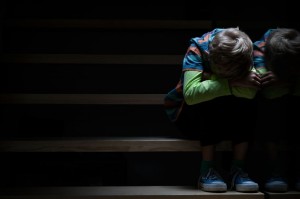It is Time to Face up to this Spanking Issue

My partner and I were on vacation in Germany when news broke that Minnesota Vikings football player Adrian Peterson had been charged with child abuse for severely whipping his four-year-old son. We had by that time visited museums and the Dachau memorial and seen many pictures of authority figures viciously beating people to make them do their bidding, to degrade them, and to instill fear.
The U.S. Alliance to End the Hitting of Children (a nonprofit organization I oversee) was flooded with requests for interviews and statements on the Peterson story. And while it’s given us a chance to get our message out, a few things need to be clarified about the significance of the Vikings’ reaction to their player, Peterson’s own remarks during interviews, and statements made by other people.
Peterson’s beating his son with a tree branch, which caused bruises and bleeding wounds that took many days to heal, is clearly child abuse and is illegal. (Peterson, who was the NFL’s MVP in 2012, faces up to two years in prison and a $10,000 fine if convicted.) Regrettably, we have no laws against spanking. U.S. child abuse laws as they stand make most people complacent about the abuse and damage of spanking.
However, beatings with wooden boards that cause severe pain and bruising on the buttocks are happening every day in school districts in nineteen U.S. states. While the Peterson case is deserving of the public’s outrage, these equally disturbing occurrences are too.
We know that 85 percent of cases involving harsh child abuse begin with spanking. Yet so many people, while clearly against child abuse, cannot see the connection. Spanking is an attitudinal window, a break of the early bond between child and parent, and a mindset that allows harsher forms of controlling children.
Importantly, though, the Peterson incident prompted numerous athletes and stars, many of them African-American, to speak against hitting children in any form. Former NFL player and commentator Cris Carter’s response on ESPN’s Sunday NFL Countdown was impressive and impassioned. While proclaiming his love and appreciation for his mother, he said she was wrong about hitting her kids, adding: “I promised my kids, I won’t teach that mess to them.” Actor Will Smith has previously spoken out against corporal punishment , and Asadah Kirkland, author of Beating Black Kids, has appeared on numerous shows.
Peterson claimed he had done no more than the cultural and religious norms of his community allowed. Let’s look at religion’s role in this.
When I was first involved with the anti-spanking movement, Gordon B. Hinckley, President of the Church of Jesus Christ of Latter-day Saints, made a strong statement saying he saw no reason at all for corporal punishment. No other church had made a similar statement at that time. In 2004 the Methodists came out against corporal punishment, but only in schools. Eight years later the Presbyterians discouraged the use of corporal punishment in all settings. The Catholics, as far as I know, have quietly put away their famous ruler on the open hand or across the knuckles as punishment for classroom infractions but have never made a statement.
But for many Christians in the Bible Belt, it’s an act of faith to use the rod and many point to the book of Proverbs. For example, Prov 22:15: “Foolishness is bound in the heart of a child; but the rod of correction shall drive it far from him,” and Prov 23:13: “Withhold not correction from the child: for if thou beatest him with the rod, he shall not die.”
We humanists can proudly say that in 1976 (four years before Sweden issued its famous ban on all forms of hitting children) the American Humanist Association issued a resolution opposing the use of corporal punishment in our public schools. The context of the resolution makes it clear that all forms of hitting children were considered wrong and contrary to the U.S. Constitution.
So in light of all this, where are we as humanists and as Americans? The uproar over Adrian Peterson, which has resulted in taking him off the football field and a loss of advertisers and a few sponsors for the Vikings, is definitely encouraging in that the culture has elevated children’s rights.
But the greatest roadblock that remains is the cultural one. Many citizens and legislators still see spanking as less than child abuse, a harmless form of discipline that “happened to them, and they turned out okay.” Many of these types belong to the churches that have made statements against hitting children, or have said nothing (this could include the huge number of Catholic Latinos.)
This is the cultural attitude that the U.S. Alliance to End the Hitting of Children is working hardest to change. Currently we have the science behind us about the damage hitting does to the developing brain, the immune system, and executive function, and we even have biblical research that shows Proverbs can’t be used to justify claims about the rod and God’s will.
I encourage the American Humanist Association to reassert its stance that the hitting of children by their parents and their teachers is wrong. I warmly remember an AHA meeting in San Francisco. After introducing myself, I was applauded when I mentioned the cause I was working on. I’ll never forget that support. The issue is clear to us humanists and has been for a long time.
